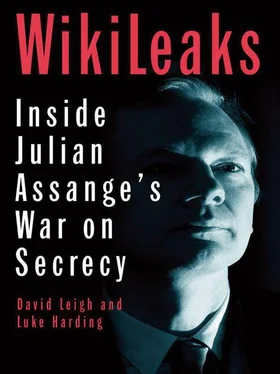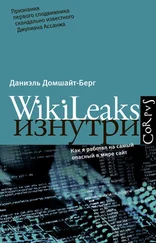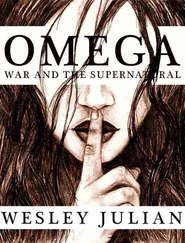Harding, Luke - WikiLeaks - Inside Julian Assange's War on Secrecy
Здесь есть возможность читать онлайн «Harding, Luke - WikiLeaks - Inside Julian Assange's War on Secrecy» весь текст электронной книги совершенно бесплатно (целиком полную версию без сокращений). В некоторых случаях можно слушать аудио, скачать через торрент в формате fb2 и присутствует краткое содержание. Жанр: Старинная литература, на английском языке. Описание произведения, (предисловие) а так же отзывы посетителей доступны на портале библиотеки ЛибКат.
- Название:WikiLeaks: Inside Julian Assange's War on Secrecy
- Автор:
- Жанр:
- Год:неизвестен
- ISBN:нет данных
- Рейтинг книги:3 / 5. Голосов: 1
-
Избранное:Добавить в избранное
- Отзывы:
-
Ваша оценка:
- 60
- 1
- 2
- 3
- 4
- 5
WikiLeaks: Inside Julian Assange's War on Secrecy: краткое содержание, описание и аннотация
Предлагаем к чтению аннотацию, описание, краткое содержание или предисловие (зависит от того, что написал сам автор книги «WikiLeaks: Inside Julian Assange's War on Secrecy»). Если вы не нашли необходимую информацию о книге — напишите в комментариях, мы постараемся отыскать её.
WikiLeaks: Inside Julian Assange's War on Secrecy — читать онлайн бесплатно полную книгу (весь текст) целиком
Ниже представлен текст книги, разбитый по страницам. Система сохранения места последней прочитанной страницы, позволяет с удобством читать онлайн бесплатно книгу «WikiLeaks: Inside Julian Assange's War on Secrecy», без необходимости каждый раз заново искать на чём Вы остановились. Поставьте закладку, и сможете в любой момент перейти на страницу, на которой закончили чтение.
Интервал:
Закладка:
Just before close of play, the bail conditions were met. At 5.48pm Assange emerged on to the steps of the high court into the flash-flare of TV cameras and photographers – clutching his bail papers, his right arm raised in triumph. There were whoops and cheers from his supporters. He had been in prison a mere nine days. But the atmosphere was as if he was had made the long walk to freedom, just like Nelson Mandela. Assange addressed the crowd:
It’s great to smell [the] fresh air of London again … First, some thank-yous. To all the people around the world who had faith in me, who have supported my team while I have been away. To my lawyers, who have put up a brave and ultimately successful fight, to our sureties and people who have provided money in the face of great difficulty and aversion. And to members of the press who are not all taken in and considered to look deeper in their work. And, I guess, finally, to the British justice system itself, where if justice is not always the outcome at least it is not dead yet.
During my time in solitary confinement in the bottom of a Victorian prison I had time to reflect on the conditions of those people around the world also in solitary confinement, also on remand, in conditions that are more difficult than those faced by me. Those people need your attention and support. And with that I hope to continue my work and continue to protest my innocence in this matter and to reveal, as we get it, which we have not yet, the evidence from these allegations. Thank you.
It was a strange little speech, executed in curiously looping phrases and odd syntax. But as a piece of TV theatre it was perfect – with Assange identifying himself with freedom and justice, while expressing a virtuous concern for his fellow man. His lawyers standing to his side – Robertson, Robinson, and Stephens – seemed to be trying to radiate both solemnity and delight. In the long run, the court’s decision was unlikely to change much: Assange had yet to confront his accusers in Sweden; the prospect of extradition to the US loomed like a dark ghost. But for the moment Assange and WikiLeaks were back in business.
He swept out of the court in Smith’s old armour-plated Land Rover, originally driven by him all the way back from Bosnia and more usually parked – sometimes with a flat tyre – outside the Frontline Club. With snow beginning to fall, the Guards officer and the internet subversive set off together on the latest step of their big adventure. For Smith there had previously been the Balkans and Iraq and the mountains of central Afghanistan, where the temperatures fall below freezing at night. This was something new, which also had several ingredients in common with wars and war reporting. There was adrenaline, lots of it. There was a sense of living for the moment. But, above all, there was uncertainty. Nobody quite knew what would happen next.
CHAPTER 18
The future of WikiLeaks
Ellingham Hall, Norfolk, England
Christmas 2010
“ Julian is a spectacular showman for the youngsters of the internet era who are disgusted with the seniors ”
JOHN YOUNG, CRYPTOME.ORG, 15 JULY 2010
Sitting in the kitchen of his temporary country home with the Guardian ’s Ian Katz and Luke Harding, Assange contemplated the uncertain long-term future of WikiLeaks. He was looking better – still somewhat wrung out after his brief ordeal in Wandsworth prison, but cheerful and composed. It was a pleasant English scene: stilton cheese and fruitcake were on the table; two female kitchen workers were chopping up beef for dinner; his host Vaughan Smith’s father was once more protectively prowling the grounds with his rifle and deerstalker hat; and sacks full of Christmas cards and fan mail for Assange were arriving daily for the mantelpiece.
But anxiety was never far away. The previous night, yet another grandstanding commentator on Fox News had called for Assange’s death. “It’s quite dangerous actually. I’m known to be in a particular place at a particular time,” he said, casting a glance out of the window and across the estate. He had been thinking about how he would handle life in an American jail if they ever sought to extradite him: “I would … have a high chance of being killed in the US prison system, Jack Ruby style, given the continual calls for my murder by senior and influential US politicians.”
Even in his moments of gloom, Assange could not resist painting himself on a canvas of historical importance: in 1963 Jack Ruby shot to death Lee Harvey Oswald, days after Oswald was arrested for the assassination of President John F Kennedy. Many people at the time thought Oswald had to be silenced, because he Knew Too Much.
Assange’s counsel, Geoffrey Robertson, was even more extreme in his predictions. He told one British court: “There is a real risk … of him being detained at Guantánamo Bay … There is a real risk that he could be made the subject of the death penalty.”
By Christmas, there were indeed some reasons to wonder whether the WikiLeaks phenomenon might not be on the way out. Was it a brief comet that had streaked across the sky throughout 2010, thanks to an extraordinarily audacious act by one young soldier, but was now likely to be extinguished? The supposed leaker of the tsunami of documents, Bradley Manning, could only look forward to his court martial in the spring, followed, no doubt, by many grim years in a US brig. Meanwhile, anyone who typed in the URL “wikileaks.org” got a message that the operation was not functioning: “At the moment WikiLeaks is not accepting new submissions.”
There were money uncertainties, too. The Germany-based Wau Holland Foundation, WikiLeaks’ main financial arm, for the first time released some data about revenue from donations at the end of the year. It showed that Assange was trying to put his team on a more regular footing, with salaries for key employees costing €100,000 a year, including €66,000 annually to go to him. Another €380,000 was going on expenses, including hardware and travel. Thanks to the global publicity generated with his newspaper partnership, WikiLeaks had acquired an impressive €1 million in donations in 2010. But closer analysis showed donations had dropped off significantly in the second half of the year: by August, the site had raised about €765,000, meaning it only collected about €235,000 subsequently.
Assange said the “political interference” by the US, which had led corporations such as Visa and MasterCard to stop donations to WikiLeaks, had dealt his organisation a blow. It was “economic censorship outside the judicial system”. By his estimate, pulling these financial plugs cost WikiLeaks half a million euros in donations – a war chest that could have funded its operations for another six months. Assange added that his own defence fund had been “totally paralysed”. “We don’t have enough money to pay our legal bills,” he said. At this point WikiLeaks’ projected legal costs had risen to £ 200,000, with his own personal legal bill at another £ 200,000. It even cost him £ 16,000 to have the Swedish material in his case translated into English, he claimed.
These legal difficulties over his Swedish sex case were yet another brake on WikiLeaks’ future. The nomadic Assange was grounded. Because of his bail conditions, he was shackled to Ellingham Hall – almost literally so, since he had to wear an electronic tag round his ankle, even in the bath. He hated that, describing it in an interview with Paris Match magazine as “emasculating” and a “chastity belt”. He also had to turn out and report in person daily to the local police station. The future held the possibility of a wearying legal fight to avoid extradition to Sweden, and perhaps a long-lasting shadow over his reputation because he was not willing to face his accusers.
Читать дальшеИнтервал:
Закладка:
Похожие книги на «WikiLeaks: Inside Julian Assange's War on Secrecy»
Представляем Вашему вниманию похожие книги на «WikiLeaks: Inside Julian Assange's War on Secrecy» списком для выбора. Мы отобрали схожую по названию и смыслу литературу в надежде предоставить читателям больше вариантов отыскать новые, интересные, ещё непрочитанные произведения.
Обсуждение, отзывы о книге «WikiLeaks: Inside Julian Assange's War on Secrecy» и просто собственные мнения читателей. Оставьте ваши комментарии, напишите, что Вы думаете о произведении, его смысле или главных героях. Укажите что конкретно понравилось, а что нет, и почему Вы так считаете.












